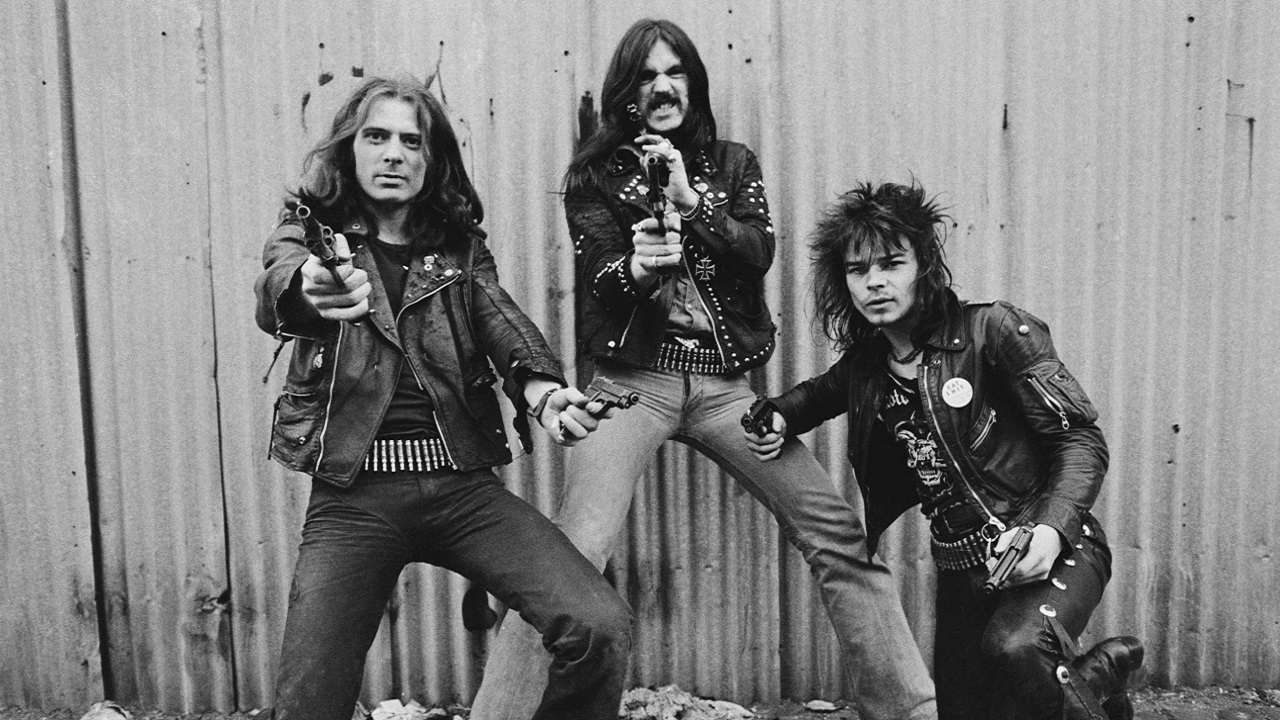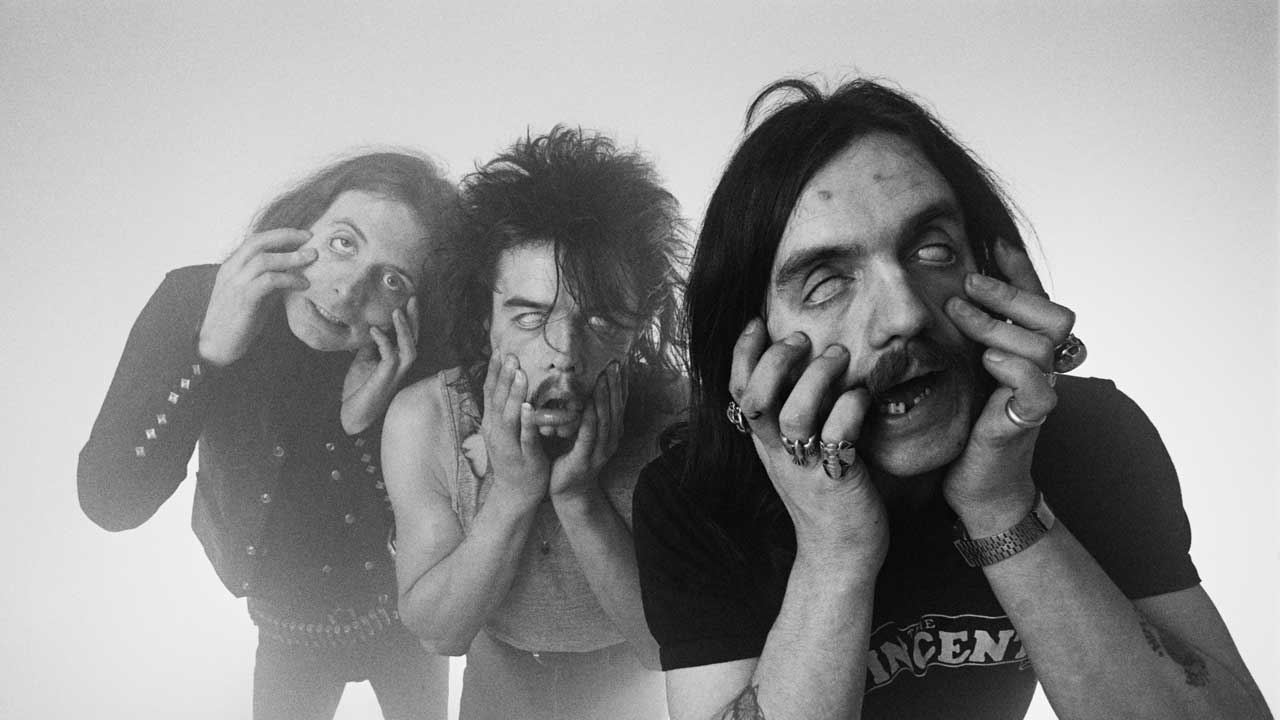"Ballet shoes and Motorhead don't mix": The history of Motorhead in 12 songs
From the song that gave the band its name to their tribute to a fellow music legend, these are the songs that tell the story of Motorhead - the greatest rock'n'roll band to ever live

Select the newsletters you’d like to receive. Then, add your email to sign up.
You are now subscribed
Your newsletter sign-up was successful
Want to add more newsletters?

Every Friday
Louder
Louder’s weekly newsletter is jam-packed with the team’s personal highlights from the last seven days, including features, breaking news, reviews and tons of juicy exclusives from the world of alternative music.

Every Friday
Classic Rock
The Classic Rock newsletter is an essential read for the discerning rock fan. Every week we bring you the news, reviews and the very best features and interviews from our extensive archive. Written by rock fans for rock fans.

Every Friday
Metal Hammer
For the last four decades Metal Hammer has been the world’s greatest metal magazine. Created by metalheads for metalheads, ‘Hammer takes you behind the scenes, closer to the action, and nearer to the bands that you love the most.

Every Friday
Prog
The Prog newsletter brings you the very best of Prog Magazine and our website, every Friday. We'll deliver you the very latest news from the Prog universe, informative features and archive material from Prog’s impressive vault.
They were Motorhead, they played rock'n'roll. Across their 40 year career, Motorhead became symbolic of the life-long affair fans had with rock'n'roll, with 22 studio albums and some of the greatest live albums ever recorded giving the band an impressive arsenal of anthems that invaded the charts, inspired musical subgenres and confirmed them to be the loudest band on the planet.
Formed by frontman Lemmy Kilmister after his unceremonious dumping from prog rockers Hawkwind for taking "the wrong drugs", Lemmy remained the band's only consistent member for the next 40 years, becoming a legendary figure in his own right in the process. We've already discussed Motorhead's greatest songs at length, but here you'll find 12 choice cuts that present a history of the band.

Motorhead (Motorhead, 1977)
Before Motorhead was a band, it was a song. Written during Lemmy's tenure with prog rockers Hawkwind, the original version of Motorhead was recorded during sessions for Warrior On The Edge Of Time and sounded more like someone doing a rock'n'roll on the Doctor Who theme than the greasier-than-a-chippy-gutter version that would become the early calling card for his next band.
An ode to speed freaks - of which Lemmy very much counted himself - the track went through a steady metamorphasis as Motorhead came into their own, an early version on the ultimately-abandoned-then-dusted-off not-quite-debut On Parole splitting the difference between prog weirdness and thundering rock'n'roll before getting a more definitive reimagining for the band's official debut called... you guessed it, Motorhead.
Overkill (Overkill, 1979)
By Motorhead's second album they'd really found their groove - one that was naturally faster and rougher than just about anything in rock'n'roll or metal at the time, helping set the pace for extreme metal in the 80s and beyond.
Hammering in on a double-bass intro from Philthy Animal Taylor, Overkill was Motorhead staking their claim on being the loudest rock'n'roll band on the planet, settling into their iconic sound and already clawing their way into international charts.
Ace Of Spades (Ace Of Spades, 1980)
After Bomber peaked just outside the top 10 of the UK album charts, it was apparent Motorhead were onto something special. The abandoned debut recording On Parole was dusted off for release by unscrupulous souls at United Artists without the band's permission, only further fostering Lemmy's natural distrust of label suits.
Sign up below to get the latest from Metal Hammer, plus exclusive special offers, direct to your inbox!
In 1980 their next official album Ace Of Spades hurtled its way into number 4 of the UK charts, the title track becoming both a calling card for the band in years to come and something of an albatross around their necks. In his 2002 autobiography White Line Fever, Lemmy wrote: "“I’m sick to death of it now. We didn’t become fossilised after that record, you know, we’ve had quite a few good releases since then. But the fans want to hear it so we still play it every night. For myself, I’ve had enough of that song.”
It didn't stop the band from playing it at pretty much every gig they ever played after the song's release however, and even brought the band's classic line-up back together in 2014 when Motorhead performed the song at Birmingham's NIA Arena with both Fast Eddie and Philthy, scarcely a year before both Lemmy and Philthy passed away.
Please Don't Touch (ft. Girlschool) (St. Valentine's Day Massacre, 1981)
After the colossal breakout success of Ace Of Spades took them everywhere from Top Of The Pops to The Young Ones, Motorhead could do no wrong - in 1981, at least. That year the band's live album No Sleep 'Till Hammersmith hit number 1 in the UK charts - their only album to do so - and they released the St. Valentine's Day Massacre, a split EP with frequent tour-buddies Girlschool.
Signed to the same label as Motorhead and working with frequent 'head collaborator Vic Maille, the St. Valentine's Day Massacre concept was simple: get two rough-n-greasy rock'n'roll bands to cover a few OG 50s classic rock'n'roll tunes. Originally written by Johnny Kidd & The Pirates, Motorhead and Girlschool's joint take on Please Don't Touch took full advantage of the ear-splitting racket both bands were capable of, clawing its way to a number 5 spot on the UK charts and paving the way for Girlschool's own top 10 chart invasion a few months later with second album Hit And Run.
Stand By Your Man (1982)
After the massive success of the St. Valentine's Day Massacre EP, it seemed only fair the band might try to take another slice of the pie. 1982's Iron Fist was still a commercial success - if a drop-off at number six in the UK compared to No Sleep's chart-topping performance and Ace Of Spades peak at number four - but behind the scenes cracks were appearing in the classic unit.
Lemmy hadn't been shy in voicing his dissatisfaction with the production on Iron Fist, a joint effort between Will Reid Dick and guitarist "Fast" Eddie Clarke, and when the duo were once again enlisted to sit at the desk for Motorhead's next single - a somewhat baffling choice to cover country song Stand By Your Man with Plasmatics singer Wendy O. Williams - grumbles turned into a blow-up that caused Eddie's exit from the band. The single failed to both replicate the feverous energy of Please Don't Touch and its chart success, sinking without a trace and taking Motorhead's classic trio with it.
Back At The Funny Farm (Another Perfect Day, 1983)
"Ballet shoes and Motorhead don't mix." So said Lemmy of the band's short-lived recruitment of former Thin Lizzy guitarist Brian Robertson, Robbo only lasting one record before quietly slipping out the back door.
More's the pity: while hated at the time, Robertson brought a sense of flair back to Motorhead's playing with guitar licks that had gone severely neglected since the band's Bomber days, while Lemmy's insistence that "I really like this jacket/but the sleeves are much too long" showcasing an increasingly witty sensibility that had crept into his songwriting. Alas, appreciators were few and far between: the album stalled at number 20 in the UK and Robertson left the band in November that year, Lemmy later ruling that, "I've enjoyed all the line-ups – but not that one. That was the lowest point in our career."
Orgasmatron (Orgasmatron, 1986)
In the great unmade biopic of Motorhead that must surely languish on some Hollywood exec's desk, Orgasmatron would mark the low-point for our plucky heroes. Creatively, the band were still firing, albeit in a reduced capacity, even with the recruitment of two new guitarists in the form of Phil Campbell and Michael "Wurzel" Burston, but financially the band were in the doldrums.
An acrimonious split with Bronze Records saw the band struggle to find a label to release new music and ultimately they decided to set up their own in GWR. Orgasmatron is by no means a bad Motorhead album - or song, for that matter - but it lacks either the pzzaz of the band's earliest recordings and the thunder of their post-Ace Of Spades material, falling into a hard, heavy but overly lumpen space in between.
While they were never going to be Iron Maiden in the live theatrics space, Motorhead had shown some inclination towards flair with the enormous Bomber lighting rig at the turn of the 80s, but an attempt to replicate it with an "Orgasmatron machine"... which turned out to be too big for the venues the band were playing, so a total waste of cash the band really didn't have.
1916 (1916, 1991)
It's no secret that Lemmy was fascinated by war, curating his own massive - and somewhat controversial - collection of war memorabilia and writing countless songs on the subject. None has been more enduring however than 1916, the title-track of Motorhead's 1991 record a shock for anyone who only knew the band for louder-than-everything-else songs like Ace Of Spades.
An emotive ballad, the song was a demonstration that Motorhead were changing to meet the new decade, a change of locale to Los Angeles also opening up more opportunities for both the band and Lemmy as a songwriter, his work with Ozzy Osbourne on 1991's No More Tears helping bring Motorhead back into the public consciousness.
Born To Raise Hell (ft. Ice-T and Whitfield Crane) (Bastards, 1994)
Did Motorhead go nu metal? Not quite. By no means strangers to crossing over into movie and TV-land, having made appearances in both The Young Ones and Eat The Rich in the 80s, with Airheads the band went full Hollywood as they popped up not only on the movie's soundtrack, but on-screen at a crucial point in the film.
Their soundtrack contribution, Born To Raise Hell also saw the band team up with rapper Ice-T and Ugly Kid Joe frontman Whitfield Crane for a rap-rock'n'roll mesh-up that only helped further boost their profile after it had flagged in the 80s. Their troubles weren't over yet, but the arrival of Mikkey Dee behind the drumkit helped stabilise their line-up and secure their future.
The Game (2001)
Motorhead once again slipped off the radar as the 90s wore on, albums like Sacrifice, Overnight Sensation and Snake Bite Love failing to excite critics or fans in the way their early 90s comeback had promised. 2000's We Are Motorhead was at least an improvement, capturing some of the heft that had been the band's bread and butter in their heyday, but it was stand-alone single The Game that shot them back into the public consciousness.
Written as the theme tune for WWF wrestler Triple H, The Game was a well-timed shot in the arm that put Motorhead on screens around the world again as the band made a live appearance on WrestleMania X-Seven in 2001. It set the band up for the new millennium and helped remind the public of their greatness.
Whorehouse Blues (Inferno, 2004)
Stripped back down to a trio of Lemmy, Phil Campbell and Mikkey Dee since 1996's Overnight Sensation, Inferno felt like the point Motorhead truly came back to the fore so far as critical and public perceptions went. Appearances on Never Mind The Buzzcocks had helped cement the sense that Lemmy was a living icon, while a regular touring cycle that would see the band return to the UK each winter for an extensive run of dates confirmed their lean days were well and truly behind them.
But Inferno was much more than that, too. Heavier than anything the band had produced in years, it also showed off dynamics that added another string to the band's bow, not least in closing track and brilliant bluesy ballad Whorehouse Blues. An acoustic number, the track became a choice favourite at subsequent Motorhead gigs and paved the path for another re-release of Ace Of Spades in 2010 with its own bluesy rendition as well as other bluesy ballads like Dust And Glass on subsequent releases.
Heroes (Under Cover, 2017)
Motorhead's final decade was characterised by an indefatiguable sense of workmanship that carried them on tours around the world until just weeks before Lemmy's passing in December 2014. The band's final album, 2014's Bad Magic was a typically rollicking affair, a fitting swan-song from a band who had never stopped working even when the money dried up.
One of the last songs ever recorded by Motorhead, Heroes wouldn't be released until 2017 for the covers album Under Cöver, but provides a poignant and fitting swansong for the band, a tip of the hat towards a fellow British musical icon who passed away barely weeks after Lemmy himself. Proof that there was so much more to Motorhead than bluster, Heroes is a demonstration that even at the very end, the band were capable of undeniable, unreplicatable magic.
Staff writer for Metal Hammer, Rich has never met a feature he didn't fancy, which is just as well when it comes to covering everything rock, punk and metal for both print and online, be it legendary events like Rock In Rio or Clash Of The Titans or seeking out exciting new bands like Nine Treasures, Jinjer and Sleep Token.

